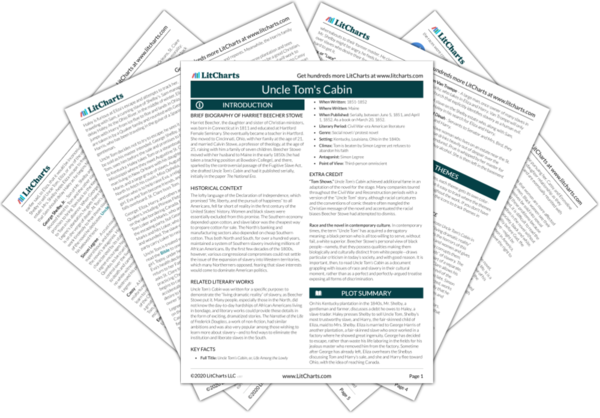Summary
Analysis
Tom is to be handed off. His wife acknowledges that, as a Christian, she should put her faith in God’s hands, but she finds the task difficult. Tom replies that he knows he will find comfort in the Lord, and the Lord will protect him. Tom won’t allow Chloe to speak ill of Mr. Shelby. Tom argues, that Shelby is only doing what he must, that Shelby can’t be expected to care deeply about all his slaves, and that they have been treated well on the Shelby estate.
Again Tom defends his master, claiming that it is right for Mr. Shelby to values his own life and family above the lives of his slaves. Tom’s Christian love is evident here, even in the face of terrible tragedy and loss. Aunt Chloe, also a Christian woman, has an understandably more difficult time with Tom’s leaving.
Themes
Beecher Stowe states that black people are not inclined to travel and adventure but rather are home-bodies, more inclined to what is known that to what is unknown. Many escaped slaves in Canada, she reports, left their relatively kind masters because they feared being sold south to greater horrors.
This instance of Beecher Stowe’s direct address is particularly jarring to the contemporary reader, exhibiting a prejudice against black people that is obviously discredited today.
Themes
As Uncle Tom and Aunt Chloe eat breakfast together, Aunt Chloe can’t contain her weeping. Uncle Tom is quiet, sadly resigned to his fate. Mrs. Shelby arrives, claims she can offer no gift of use to Tom now, and promises again to buy back Tom once the Shelbys have the funds. Haley arrives and Aunt Chloe vows not to cry in front of so cruel and unfeeling a man.
Mrs. Shelby renews her promise to buy Tom back and shows her guilt. Mrs. Shelby and St. Clare are perhaps the most sympathetic slave-owners in the novel, although Mrs. Shelby does not desire to free all her slaves, as St. Clare finally resolves to do.
Themes
Haley shackles Tom, arguing that he has already lost 500 dollars at the Shelby estate. Tom gives his love to Master George, who is away at a friend’s and who has yet to learn of Tom’s sale. Mr. Shelby is out on business, hoping that Tom’s transfer will be finished out of his sight.
Mr. Shelby’s guilt mirrors and opposes his wife’s—rather than see the slaves before Tom is sold, Mr. Shelby shields himself by leaving the estate. He is a moral coward. George Jr.’s trip is an instance of bad luck, as is his arrival at Legree’s later in the novel, just after Tom has been mortally wounded.
Themes
Get the entire Uncle Tom's Cabin LitChart as a printable PDF.

Haley stops with Tom at a blacksmith’s shop to tighten his shackles. The smith claims that Tom is faithful and need not be bound. Haley replies that supposedly “faithful” slaves are exactly the ones to watch out for. When the smith speaks of the terrible conditions on many southern plantations, Haley replies that he will try to get Tom a household position. Meanwhile, outside, Master George arrives and offers Tom a dollar, which Tom denies graciously, saying it is of no use to him. Tom tells George to be good, to work hard, and to behave as a Christian young man.
An example of the nonsense and misleading arguments slave-owners make to justify their actions. Why would a loyal slave be more likely to run away than a disloyal slave? In fact Haley trusts no slaves, which is why he thinks Tom must be shackled. Tom’s relationship with George mimics in many ways a father-son relationship—indeed, this relationship is more pronounced than George’s interactions with his own father.
Themes
George promises Tom he will be good and bring Tom back. When Haley returns outside to the carriage, George argues with him, saying it is evil to trade in slaves. Haley answers, once again, that he is only making a living, and George swears never to buy or sell slaves when he is older. George leaves, and Haley tells Tom to behave—if he is “fair,” then Haley will treat him “fair.” Tom assents though he remains shackled as they begin their journey south.
George renews his mother’s promise and makes good on it at the end of the novel, only a few days too late. His promise never to buy slaves becomes a willingness to free slaves, once he has taken over his father’s estate. Again, Haley’s fairness is one that champions business and profit over the rights of human beings.
Themes












